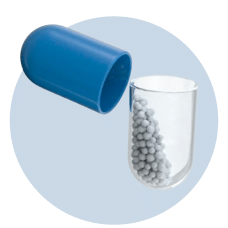- Vitamins & Supplements
- Multivitamins
- TestUdpTemporary
- Vitamins A-Z
- Mineral Supplements
- Multivitamins for Age 50+
- banner
- test 98
- Nutritional Drinks
- Adult Daily Nutrition
- Kids Nutrition (2-15 Yrs)
- For Women
- Top Deals in Supplements
- Health Food & Drinks
- Green Tea & Herbal Tea
- Herbal Juice
- Apple Cider Vinegar
- Healthy Snacks
- Protein Supplements
- Whey Protein
- Amino Acids
- Mass Gainers for testing purpose testing
- Workout Essential
- Fat Burners
Fenabrate 160mg Tablet
Prescription Required
Product introduction
Fenabrate 160mg Tablet is a medicine used to treat high cholesterol. This medicine helps by lowering triglycerides and "bad" cholesterol (LDL), while at the same time raising the levels of "good" cholesterol (HDL). Lowering cholesterol levels reduces the risk of heart attack and stroke.
Fenabrate 160mg Tablet is a medicine used to reduce triglyceride and high cholesterol levels. It increases HDL (high density lipoprotein) levels, which helps to reduce the risk of having any heart diseases. Lifestyle changes such as intake of low-fat diets, exercise and weight loss, cessation of alcohol, etc. help in better results. It may cause increased liver enzymes, nausea, flatulence, abdominal pain, and diarrhea as side effects.
Fenabrate 160mg Tablet is a medicine used to reduce triglyceride and high cholesterol levels. It increases HDL (high density lipoprotein) levels, which helps to reduce the risk of having any heart diseases. Lifestyle changes such as intake of low-fat diets, exercise and weight loss, cessation of alcohol, etc. help in better results. It may cause increased liver enzymes, nausea, flatulence, abdominal pain, and diarrhea as side effects.
Uses of Fenabrate Tablet
Benefits of Fenabrate Tablet
In High cholesterol
Fenabrate 160mg Tablet effectively reduces the high cholesterol levels in your body. Lowering the amount of cholesterol reduces the chances of heart diseases and helps you remain healthier for longer. Take it regularly and make appropriate lifestyle changes (such as eating healthy and staying active) to maximize the effectiveness of this medicine. Keep taking it even if you feel well.
Side effects of Fenabrate Tablet
Most side effects do not require any medical attention and disappear as your body adjusts to the medicine. Consult your doctor if they persist or if you’re worried about them
Common side effects of Fenabrate
- Increased liver enzymes
- Nausea
- Vomiting
- Flatulence
- Abdominal pain
- Diarrhea
- Headache
- Back pain
- Increased creatine phosphokinase (CPK) level in blood
- Inflammation of the nose
How to use Fenabrate Tablet
Take this medicine in the dose and duration as advised by your doctor. Swallow it as a whole. Do not chew, crush or break it. Fenabrate 160mg Tablet is to be taken with food.
Safety advice
Alcohol
UNSAFE
It is unsafe to consume alcohol with Fenabrate 160mg Tablet.
Pregnancy
CONSULT YOUR DOCTOR
Fenabrate 160mg Tablet may be unsafe to use during pregnancy. Although there are limited studies in humans, animal studies have shown harmful effects on the developing baby. Your doctor will weigh the benefits and any potential risks before prescribing it to you. Please consult your doctor.
Breast feeding
CONSULT YOUR DOCTOR
Fenabrate 160mg Tablet is probably unsafe to use during breastfeeding. Limited human data suggests that the drug may pass into the breastmilk and harm the baby.
Driving
SAFE
Fenabrate 160mg Tablet does not usually affect your ability to drive.
Kidney
CAUTION
Fenabrate 160mg Tablet should be used with caution in patients with kidney disease. Dose adjustment of Fenabrate 160mg Tablet may be needed. Please consult your doctor.
Use of Fenabrate 160mg Tablet is not recommended in patients with severe kidney disease.
Use of Fenabrate 160mg Tablet is not recommended in patients with severe kidney disease.
Liver
UNSAFE
Fenabrate 160mg Tablet is probably unsafe to use in patients with liver disease and should be avoided. Please consult your doctor.
Use of Fenabrate 160mg Tablet is not recommended in patients with severe liver disease.
Use of Fenabrate 160mg Tablet is not recommended in patients with severe liver disease.
All substitutes
For informational purposes only. Consult a doctor before taking any medicines.
Fenabrate 160mg Tablet
₹12.0/Tablet
Lipicard 160 Tablet
USV Ltd
₹16.32/tablet
43% costlier
Feno-TG 160mg Tablet
Troikaa Pharmaceuticals Ltd
₹17.7/tablet
55% costlier
Finobrate 160 Tablet
Knoll Pharmaceuticals Ltd
₹11.5/tablet
1% costlier
TG Chek 160mg Tablet
Torrent Pharmaceuticals Ltd
₹7/tablet
39% cheaper
Tigifib 160mg Tablet
Elder Pharmaceuticals Ltd
₹7.8/tablet
32% cheaper
Quick tips
- It should be taken with food.
- Avoid alcohol consumption while taking this medication.
- Your doctor may check your liver function before starting treatment and regularly thereafter. Notify your doctor if you are more tired than usual, do not feel hungry, or if you have yellow eyes, skin or dark urine.
- Inform your doctor if you experience muscle pain, tenderness, cramps, or weakness while taking Fenabrate 160mg Tablet, particularly if it is accompanied by a fever.
- Do not discontinue Fenabrate 160mg Tablet without consulting your doctor even if you feel better.
Fact Box
Chemical Class
PPAR alpha
Habit Forming
No
Therapeutic Class
CARDIAC
Action Class
PPAR alpha agonists (Fibrate)
Patient concerns
FAQs
When should Fenabrate 160mg Tablet be taken?
Usually, Fenabrate 160mg Tablet is taken once daily with a meal. The initial dose of the medicine will depend on the type and age of the patient. Consult your doctor before you start taking the medication and follow the instructions as provided.
Does Fenabrate 160mg Tablet raise blood pressure?
There is no or negligible effect on blood pressure in patients with normal blood pressure levels. However, Fenabrate 160mg Tablet may lead to a decrease in blood pressure in patients with high blood pressure.
What drugs should not be taken with Fenabrate 160mg Tablet?
There are few drugs like Oral Anticoagulants or blood thinners, ciclosporin, cholesterol-lowering medications like statins and contraceptives are contraindicated while you take Fenabrate 160mg Tablet. Along with that, there are certain medicines which should not be taken with Fenabrate 160mg Tablet and therefore you must give a proper history to your doctor regarding your ongoing medication. This is done to analyze the condition and provide a proper therapy and prescription which will help minimizing the side effects of the medication.
Can Fenabrate 160mg Tablet cause kidney problems?
Fenabrate 160mg Tablet should be used with caution in patients with kidney disorders. Serum creatinine levels may increase with long-term usage of Fenabrate 160mg Tablet but is completely reversible. The evidence of kidney damage with this medicine is rare still the kidney function blood test should be done regularly if there is a possibility of kidney damage. Consult your doctor before taking the medicine. Inform the doctor if you have had any disease and all the medicines that you are taking for a better diagnosis and treatment.
Can I take grapefruit juice with Fenabrate 160mg Tablet?
Yes, you can take Fenabrate 160mg Tablet with grapefruit juice. The possibility of interaction of the medicine with grapefruit is unlikely as they are broken down in our body by different enzymes. However, if in doubt then limit the intake of grapefruit juice while taking Fenabrate 160mg Tablet.
Related ayurvedic ingredients
Disclaimer:
Tata 1mg's sole intention is to ensure that its consumers get information that is expert-reviewed, accurate and trustworthy. However, the information contained herein should NOT be used as a substitute for the advice of a qualified physician. The information provided here is for informational purposes only. This may not cover everything about particular health conditions, lab tests, medicines, all possible side effects, drug interactions, warnings, alerts, etc. Please consult your doctor and discuss all your queries related to any disease or medicine. We intend to support, not replace, the doctor-patient relationship.References
- Malloy MJ, Kane JP. Agents Used in Dyslipidemia. In: Katzung BG, Masters SB, Trevor AJ, editors. Basic and Clinical Pharmacology. 11th ed. New Delhi, India: Tata McGraw Hill Education Private Limited; 2009. p. 614-15.
- Gotto AM Jr, Opie LH. Lipid-Modifying Antiatherosclerotic Drugs. In: Opie LH, Gersh BJ, editors. Drugs for the Heart. 8th ed. Philadelphia, Pennsylvania: Elsevier Saunders; 2013. pp. 425-26.
- Briggs GG, Freeman RK, editors. A Reference Guide to Fetal and Neonatal Risk: Drugs in Pregnancy and Lactation. 10th ed. Philadelphia, PA: Wolters Kluwer Health; 2015. pp. 536-37.
Marketer details
Name: Prevego Healthcare & Research Private Limited
Address: Satyam Medical, Room No.9, Ground Floor, Laxmi Niwas 4-6, Bora Bazar Street, Fort MUMBAI Mumbai City MH 400001 IN
Country of origin: India
The list of available options shown with the same composition has been prepared upon the advice of registered medical practitioners, pharmacists affiliated with TATA 1MG. TATA 1MG does not promote any pharmaceutical product of any particular company, and all recommendations are based on the medical opinion, advisories from specialist medical and pharmaceutical professionals.
The list of available options shown with the same composition has been prepared upon the advice of registered medical practitioners, pharmacists affiliated with TATA 1MG. TATA 1MG does not promote any pharmaceutical product of any particular company, and all recommendations are based on the medical opinion, advisories from specialist medical and pharmaceutical professionals.
Lab tests offered by us

Related/Popular tests
MRP
₹120
Inclusive of all taxes
10.0 tablets in 1 strip
SOLD OUT
Available options
Available options
Same salt composition:Fenofibrate (160mg)

Same salt composition

Verified by doctors

Popularly bought

Trusted quality
Why buy these from 1mg?










